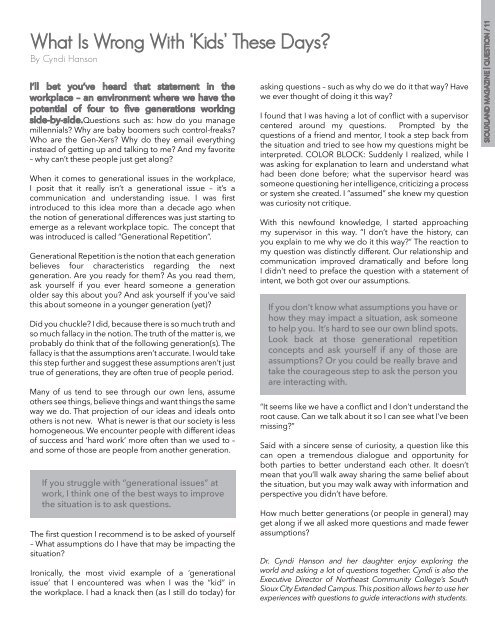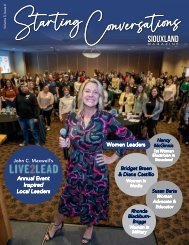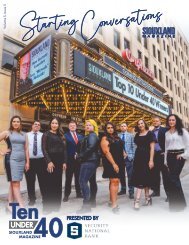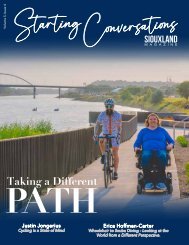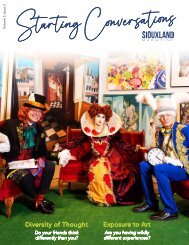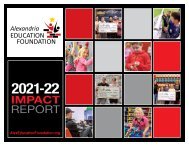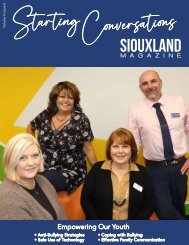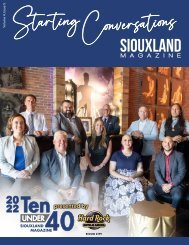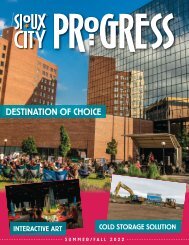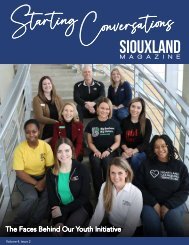Siouxland Magazine - Volume 2 Issue 2
Create successful ePaper yourself
Turn your PDF publications into a flip-book with our unique Google optimized e-Paper software.
What Is Wrong With ‘Kids’ These Days?<br />
By Cyndi Hanson<br />
I’ll bet you’ve heard that statement in the<br />
workplace – an environment where we have the<br />
potential of four to five generations working<br />
side-by-side.Questions such as: how do you manage<br />
millennials? Why are baby boomers such control-freaks?<br />
Who are the Gen-Xers? Why do they email everything<br />
instead of getting up and talking to me? And my favorite<br />
– why can’t these people just get along?<br />
When it comes to generational issues in the workplace,<br />
I posit that it really isn’t a generational issue – it’s a<br />
communication and understanding issue. I was first<br />
introduced to this idea more than a decade ago when<br />
the notion of generational differences was just starting to<br />
emerge as a relevant workplace topic. The concept that<br />
was introduced is called “Generational Repetition”.<br />
Generational Repetition is the notion that each generation<br />
believes four characteristics regarding the next<br />
generation. Are you ready for them? As you read them,<br />
ask yourself if you ever heard someone a generation<br />
older say this about you? And ask yourself if you’ve said<br />
this about someone in a younger generation (yet)?<br />
Did you chuckle? I did, because there is so much truth and<br />
so much fallacy in the notion. The truth of the matter is, we<br />
probably do think that of the following generation(s). The<br />
fallacy is that the assumptions aren’t accurate. I would take<br />
this step further and suggest these assumptions aren’t just<br />
true of generations, they are often true of people period.<br />
Many of us tend to see through our own lens, assume<br />
others see things, believe things and want things the same<br />
way we do. That projection of our ideas and ideals onto<br />
others is not new. What is newer is that our society is less<br />
homogeneous. We encounter people with different ideas<br />
of success and ‘hard work’ more often than we used to –<br />
and some of those are people from another generation.<br />
If you struggle with “generational issues” at<br />
work, I think one of the best ways to improve<br />
the situation is to ask questions.<br />
The first question I recommend is to be asked of yourself<br />
– What assumptions do I have that may be impacting the<br />
situation?<br />
Ironically, the most vivid example of a ‘generational<br />
issue’ that I encountered was when I was the “kid” in<br />
the workplace. I had a knack then (as I still do today) for<br />
asking questions – such as why do we do it that way? Have<br />
we ever thought of doing it this way?<br />
I found that I was having a lot of conflict with a supervisor<br />
centered around my questions. Prompted by the<br />
questions of a friend and mentor, I took a step back from<br />
the situation and tried to see how my questions might be<br />
interpreted. COLOR BLOCK: Suddenly I realized, while I<br />
was asking for explanation to learn and understand what<br />
had been done before; what the supervisor heard was<br />
someone questioning her intelligence, criticizing a process<br />
or system she created. I “assumed” she knew my question<br />
was curiosity not critique.<br />
With this newfound knowledge, I started approaching<br />
my supervisor in this way. “I don’t have the history, can<br />
you explain to me why we do it this way?” The reaction to<br />
my question was distinctly different. Our relationship and<br />
communication improved dramatically and before long<br />
I didn’t need to preface the question with a statement of<br />
intent, we both got over our assumptions.<br />
If you don’t know what assumptions you have or<br />
how they may impact a situation, ask someone<br />
to help you. It’s hard to see our own blind spots.<br />
Look back at those generational repetition<br />
concepts and ask yourself if any of those are<br />
assumptions? Or you could be really brave and<br />
take the courageous step to ask the person you<br />
are interacting with.<br />
“It seems like we have a conflict and I don’t understand the<br />
root cause. Can we talk about it so I can see what I’ve been<br />
missing?”<br />
Said with a sincere sense of curiosity, a question like this<br />
can open a tremendous dialogue and opportunity for<br />
both parties to better understand each other. It doesn’t<br />
mean that you’ll walk away sharing the same belief about<br />
the situation, but you may walk away with information and<br />
perspective you didn’t have before.<br />
How much better generations (or people in general) may<br />
get along if we all asked more questions and made fewer<br />
assumptions?<br />
Dr. Cyndi Hanson and her daughter enjoy exploring the<br />
world and asking a lot of questions together. Cyndi is also the<br />
Executive Director of Northeast Community College’s South<br />
Sioux City Extended Campus. This position allows her to use her<br />
experiences with questions to guide interactions with students.<br />
<strong>Siouxland</strong> <strong>Magazine</strong> | Question / 11


